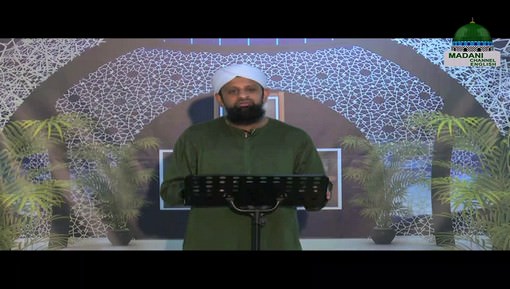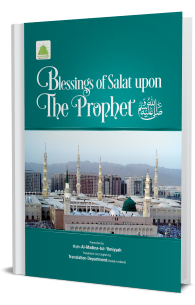
Our Prophet: The Most sublime, the Most Great
The Honour of Allah’s Messenger صَلَّى الـلّٰـهُ عَلَيْهِ وَاٰلِهٖ وَسَلَّم
(Part 16)
Mawlana Abu al-Hasan Attari Madani
The rank of our beloved Prophet صَلَّى الـلّٰـهُ عَلَيْهِ وَاٰلِهٖ وَسَلَّم is the highest. So eminent is he that whenever an allegation or insult was made against him, Allah Almighty responded on his behalf. For example, during the revelation’s interregnum (fatra al-waḥī) when revelation stopped for a while, the polytheists alleged, “The Lord of Muhammad صَلَّى الـلّٰـهُ عَلَيْهِ وَاٰلِهٖ وَسَلَّم has forsaken him.” In response, Allah Almighty revealed an entire chapter of the Quran, declaring for all eternity, “˹Dear Beloved!˺ Your Lord has not forsaken you.”[1]
Umayyah ibn Khalaf would utter blasphemies against the Messenger of Allah صَلَّى الـلّٰـهُ عَلَيْهِ وَاٰلِهٖ وَسَلَّم, so Allah Almighty refuted him and others like him in Surah Humaza.[2]
When Abū Lahab and his wife tried to harm the beloved Prophet صَلَّى الـلّٰـهُ عَلَيْهِ وَاٰلِهٖ وَسَلَّم, Allah Almighty revealed an entire surah refuting them and detailing their terrible fate.[3]
When Walīd ibn Mughīyra insulted the noble Prophet صَلَّى الـلّٰـهُ عَلَيْهِ وَاٰلِهٖ وَسَلَّم, Allah Almighty protected the honour of His Beloved by revealing many verses in refutation of Walīd, informing the entire world of his immoral behaviour and exposing his illegitimate birth.[4] One verse declares, “The one who is an enemy to My Beloved, he is deprived of all goodness.”[5]
He also promised to protect His Messenger صَلَّى الـلّٰـهُ عَلَيْهِ وَاٰلِهٖ وَسَلَّم from the evil of enemies.[6]
Whatever words were uttered by the miraculous tongue of the final Prophet صَلَّى الـلّٰـهُ عَلَيْهِ وَاٰلِهٖ وَسَلَّم, were greatly loved by Allah Almighty.
وَ مَا یَنْطِقُ عَنِ الْهَوٰىؕ(۳) اِنْ هُوَ اِلَّا وَحْیٌ یُّوْحٰىۙ(۴) [7]
Allah Almighty affirmed and empowered the statements of His Prophet صَلَّى الـلّٰـهُ عَلَيْهِ وَاٰلِهٖ وَسَلَّم, so that none could reject them.
The honour and reverence of anything attached to the Beloved
Allah Almighty grants honour and respect to everyone and everything associated with our master Muhammad صَلَّى الـلّٰـهُ عَلَيْهِ وَاٰلِهٖ وَسَلَّم: his Companions are promised Paradise;[8] his pure wives hold the highest status of any woman, and Allah Almighty confirmed their unique stature.[9]
When unfounded allegations were levelled against the beloved Prophet’s pure wife, Allah Almighty defended her innocence and exonerated her.[10]
His honour and high esteem in the Isthmus Realm (ʿālam al-barzakh)
The downpour of grace and honour was not restricted to his physical life, rather, it continues even after his veiling from this world. Allah Almighty commanded 70,000 angels to present themselves in the court of His Beloved in the morning and evening, for the sole purpose of sending prayers on him, and the matter is such that those who attend once will not return until the Day of Judgement.[11]
Showing the honour of His Beloved, He appointed an angel at his grave who presents the name of the one who sends prayers on him as well as their father’s name, regardless of their language, the time, the manner, and the quantity.[12]
Allah Almighty made success in the Isthmus Realm and the Hereafter, dependent on whether someone recognises His Beloved, such that those who recognise him will be granted salvation.[13]
His respect and reverence on the plains of resurrection
Tremendous scenes of grace and honour will also be witnessed on the plains of resurrection. He صَلَّى الـلّٰـهُ عَلَيْهِ وَاٰلِهٖ وَسَلَّم will be granted the honour of being the first to emerge from his enlightened grave, he will travel towards the plains of resurrection in the company of the noble Prophets, honourable Companions and other people of love, and will also be bestowed with many other honours.
On the Day of Judgement, when the fear of divine reckoning will consume every soul, humanity will implore the prophets to intercede for them, but each one will refuse, sending them to ask the next prophet. Eventually, people will arrive before the beloved Prophet صَلَّى الـلّٰـهُ عَلَيْهِ وَاٰلِهٖ وَسَلَّم and witness the love of Allah Almighty for him. On the plains of resurrection, when everyone will only be concerned for themselves, the beloved Prophet صَلَّى الـلّٰـهُ عَلَيْهِ وَاٰلِهٖ وَسَلَّم will prostrate to Allah Almighty, and this will also be a great honour, for Allah Almighty will say:
اِرْفَعْ رَاْسَكَ وَسَلْ تُعْطَهْ، وَقُلْ يُسْمَعْ وَاشْفَعْ تُشَفَّعْ
“Raise your head; ask and it will be granted; speak and you shall be heard; intercede and your intercession will be accepted.”[14]
On the Day of Judgement, when the previous nations will deny their Prophets and Messengers, it is the Messenger of Allah صَلَّى الـلّٰـهُ عَلَيْهِ وَاٰلِهٖ وَسَلَّم who will have the final word in making clear the truthfulness and honesty of the noble Prophets before the rejectors.[15]
His honour and reverence in Paradise
When the people of Paradise will enter Paradise, they will witness the high esteem of Allah’s Messenger صَلَّى الـلّٰـهُ عَلَيْهِ وَاٰلِهٖ وَسَلَّم therein, a brief example of which has already been mentioned, in that 1,000 servants will always be ready to serve him. In this Hadith, these servants have been described as:
بَيْضٌ مَّكْنُونٌ، أَوْ لُؤْلُؤٌ مَنْثُورٌ
The hadith scholar, Mufti Ahmad Yar Khan Na’eemi رَحْمَةُ الـلّٰـهِ عَـلَيْـه, explains:
“Bayḍ is an ostrich egg, and its plural is bayḍa. Maknūn is something that is not affected by dirt and dust, and is in its original state of cleanliness. The Arabs considered the colour of an ostrich egg to be beautiful. Hence, he رَحْمَةُ الـلّٰـهِ عَـلَيْـه said this to help them understand. The beauty of the heavenly maidens is described with these same words in the Quran. These servants have been referred to as scattered pearls, for those servants of Allah’s Messenger صَلَّى الـلّٰـهُ عَلَيْهِ وَاٰلِهٖ وَسَلَّم will be
spread in every direction, hence, comparing them to scattered pearls is befitting. These servants will either surround the beloved Prophet صَلَّى الـلّٰـهُ عَلَيْهِ وَاٰلِهٖ وَسَلَّم on the plains of resurrection or in Paradise; if it is in Paradise then they will be different to those servants that will be granted to the other dwellers of Paradise.”[16]
[1] Muslim, p. 767, Hadith 4656
[2] Seerat Ibn Hishaam, p. 141
[3] Para 30, Surah Al-Lahab
[4] Para 29, Surah Al-Qalam, Verse 13
[5] Para 30, Surah Al-Kawsar, Verse 3
[6] Para 6, Surah Al-Maa’idah, Verse 67
[7] Para 27, Surah Al-Najm, Verses 3 - 4
[8] Para 5, Surah Al-Nisa, Verse 95
[9] Para 22, Surah Al-Ahzaab, Verse 32
[10] Para 18, Surah Al-Noor, Verse 11
[11] Mishkat al-Masabih, vol. 2, p. 401, Hadith 5955
[12] Al-Salat ‘ala al-Nabi Li Ibn Abi Aasim, p. 42, Raqm 51
[13] Bukhari, vol. 1, p. 450, Hadith 1338
[14] Bukhari, vol. 3, p. 165, Hadith 4476
[15] Para 5, Surah Al-Nisa, Verse 41
[16] Mirat ul Manajeeh, vol. 8, p. 30


















Comments